

How creative industries could boost the economies of small islands crippled by COVID. Small islands in the Indian Ocean, the Caribbean or in the Pacific islands promise dream holidays and the fulfilment of bucket lists.
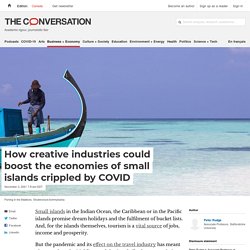
And, for the islands themselves, tourism is a vital source of jobs, income and prosperity. French app Yuka brings people power to the supermarket aisle Evaluating the Yuka ‘phenomenon’: How effective is the scanning app in practice? Yuka was launched in 2017 by three co-founders: brothers Benoit and François Martin, and friend Julie Chapon.

Since then, the platform has attracted more than 10m users scanning three million barcodes every day and expanded its presence beyond France to Belgium, Switzerland, Luxembourg, Spain, and as of June this year, the UK. The app works by scanning the barcodes of food and personal care products. The platform then rates the item and offers detailed information to help consumers understand the health of each product. Where a product is deemed to have a negative impact on the consumer’s health, the app recommends a healthier alternative. Yuka prides itself on being completely independent and objective regarding its ratings, analysis, and product recommendations. Food product analyses are based on three criteria: nutritional quality, the presence of additives, and its organic aspect.
MyRealFood: Las ‘apps’ nutricionales o cómo comer bien no debería depender de uno mismo. By UCL Institute for Innovation and Public Purpose. By Laurie Macfarlane This blog is a follow up to the recent event ‘The global housing crisis and the home ownership myth’.

Everyone Gets A Seat On The Bus, For Free, As Kansas City Transit Returns To Full Capacity. If you ever stood at a bus stop during the pandemic and watched your bus speed by without picking you up, Kansas City has some good news.
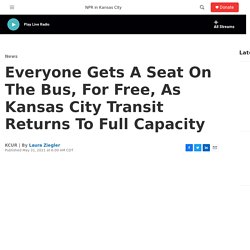
“The problem we ran into when we were social distancing and could have only half capacity on a vehicle was what you’d call a ‘pass by,’” said KCATA president and chief executive officer Robbie Makinen. “Once a bus was up to 20 people, that bus would ‘pass by’ because the bus was full. Beginning Tuesday, June 1, KCATA will drop those capacity limits. However, buses will still require riders to wear masks, in accordance with guidelines for all transit riders from the Centers for Disease Control and Prevention. Buses will continue to load and unload from both the front and back, and retain shields for bus drivers and upgraded air filtering systems. Pros & cons: Making public transportation free. The following question was recently posted on Quora: "What are the arguments against and for making public transportation free?
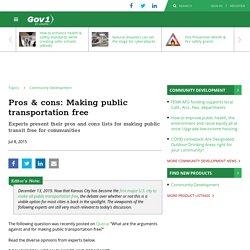
" Read the diverse opinions from experts below. Don Johnson, Urban Planner and Economist There are a couple of economic arguments for making public transportation free (or at least cheaper than it costs to provide:) Cars impose a lot of costs on society that drivers don't pay forEveryone benefits when people can travel around freely. The Pros and Cons of Recycling. As you’re reading this line right now, thousands of waste are getting dumped.
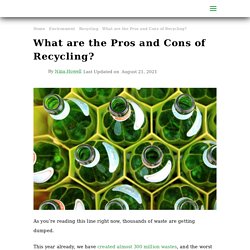
This year already, we have created almost 300 million wastes, and the worst part, it’s growing every second, and we have no control. Recycling is one of the Three R’s of Waste Hierarchy – Reduce, Reuse and Recycle. 6 Pros & Cons of Recycling (Is it Worth it?) It seems that no clean energy discussion is complete without everybody’s favorite pastime: recycling.
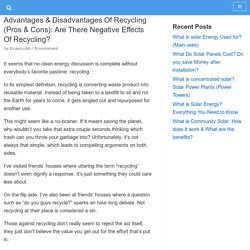
In its simplest definition, recycling is converting waste product into reusable material. Instead of being taken to a landfill to sit and rot the Earth for years to come, it gets singled out and repurposed for another use. Is Recycling Worth It Anymore? The Truth Is Complicated. Is recycling a waste? Here's the answer from a plastics expert. Photograph of the inside of a garbage collection center in Vine Hill, California, December 8, 2020.
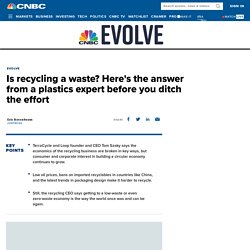
(Photo by Smith Collection/Gado/Getty Images) Smith Collection/Gado | Archive Photos | Getty Images Recycling may make you feel better in a very small way about your role in helping to avert a global apocalypse, but even in "friendly" places, from John Oliver to NPR podcasts, recycling, especially of plastics, is being given a hard look. More people are wondering: Does it work? Is Influencer Marketing On The Decline? Vice President, Digital at Clearbridge Branding Agency, overseeing clients' digital and social media efforts.
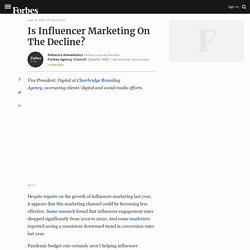
Despite reports on the growth of influencer marketing last year, it appears that this marketing channel could be becoming less effective. Some research found that influencer engagement rates dropped significantly from 2019 to 2020. And some marketers reported seeing a consistent downward trend in conversion rates last year. Pandemic budget cuts certainly aren't helping influencer marketing either; one report noted that fewer brands are working with influencers now and that we're seeing fewer sponsored posts by Instagram influencers. So what's causing these changes in the effectiveness of influencer marketing, and where do marketers go next? Influencer marketing was a buzzword in marketing for a number of years. 'I'm sick of influencers asking for free cake' Influencer Fatigue: Are We Done With Influencers?
For major brands, partnerships with celebrity influencers have become an indispensable part of their marketing strategy.
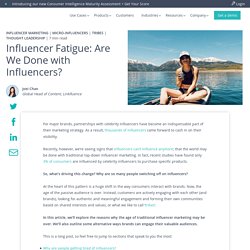
As a result, thousands of influencers came forward to cash in on their visibility. Recently, however, we’re seeing signs that influencers can’t influence anymore; that the world may be done with traditional top-down influencer marketing. In fact, recent studies have found only 3% of consumers are influenced by celebrity influencers to purchase specific products. So, what’s driving this change? Why are so many people switching off on influencers? At the heart of this pattern is a huge shift in the way consumers interact with brands. In this article, we’ll explore the reasons why the age of traditional influencer marketing may be over. What we're getting wrong about the 'Great Resignation' - BBC Worklife. How the rich are driving climate change - BBC Future. Deliveroo and Boots partnership sets new heights for Q-Commerce. Deliveroo announced a pilot scheme in August 2021, delivering hygiene and beauty products from popular high street retailer Boots. The pilot scheme will cover 14 UK cities, including London, Birmingham, Leeds, and Nottingham.
Thispartnership sees Deliveroo diversifying their delivery product offering into makeup and OTC pharmacy products. Quick commerce: pioneering the next generation of delivery – Delivery Hero. Delivery Hero is many things all at once: a global business, a local player, a family of Heroes, an employer, a tech innovator… but across the 40+ countries that we operate in with more than 22,000 employees, there is one thing that unites us: we want to deliver an amazing experience – fast, easy, and to our customers’ doors. We have approached the challenge of continuously improving our service in many ways, from partnering with more restaurants and expanding the choice on our platforms to launching our own delivery kitchen concepts. But at Delivery Hero, we like to think big. Glovo Enters The Q-Commerce Race As On-Demand Delivery Market Intensifies.
Glovo is expanding its remit by throwing its hat in the ring of ‘q-commerce’, a new battlefield in the hyper competitive delivery space for quick deliveries. The service is claiming 30-minute delivery of goods from retail brands and supermarkets. The company has partnered with Unilever, Nestle and L’Oreal for the service and supermarket chains like Walmart and Carrefour. It has also invested in its own ‘dark stores’, warehouses where retailers can house goods that are solely sold online, in Barcelona where it is headquartered as well as Madrid, Lisbon and Milan.
It plans to have 100 dark stores in Europe by the end of 2021. The Rise of Quick Commerce in 2021. ChannelSight, 29th June '21 In 2021, the modern consumer journey demands speed. From takeaway food, to online shopping deliveries, the sooner a customer has their purchase in their hands, the better. Enter the metaverse: the digital future Mark Zuckerberg is steering us toward. Facebook CEO Mark Zuckerberg on Thursday outlined his vision for the future of the social media giant, formalising the company’s focus on the metaverse.
In a presentation at the company’s annual Connect conference, Zuckerberg announced the company is rebranding as Meta and detailed how his company aims to build a new version of the internet. What is the metaverse and why is Facebook betting big on it? Speedy grocery delivery firms are racing to survive. That may drop as restaurants and shops reopen, but the pandemic may have changed buying habits for good. “I genuinely believe it’s a once-in-a-generation spending shift from offline to online, and Covid’s’s just accelerated that,” says Alec Dent, co-founder and COO of Weezy, a London-based startup promising to deliver produce in 15 minutes. British and German consumers are increasingly “uptrading” in the pandemic – buying higher quality and more sustainable produce.
Say Hello To Q-Commerce: The Era Of Hyper-Local Delivery Is Here. The Case Against Following Social Media Influencers. Virtual influencer: for or against? UK’s top climate adviser says criticism of net zero goal is ‘defeatist’ Climate scientists: concept of net zero is a dangerous trap. Sometimes realisation comes in a blinding flash. BBC Radio 4 - Analysis, The Zoomshock Metropolis. The National Trust is under attack because it cares about history, not fantasy. The National Trust is in trouble. Environmental impact, safety, production. Buying into the bitcoin fantasy will cost us dear.
Welcome to DarkSide – and the inexorable rise of ransomware. Boris's green industrial revolution is doomed to fail. Boris Johnson's ‘green industrial revolution’, which was announced this week, looks doomed from the outset. Let’s take a trip round the green new world of Britain in 2050. Is free public transport everything it is cracked up to be? Good business sense? Why ethical companies often outperform. ‘Why would I ever go back to shopping new?’: how vintage has become the future of buying ethically. What are green jobs – and why are they important? Boris Johnson: Wind farms could power every home by 2030.
31 Major Pros & Cons Of Electric Scooters - E&C. 10 reasons to love & hate e-scooters. Invasion of the electric scooter: can our cities cope? The e-scooter: road menace or saviour of the commute? Are Electric Scooters Awesome or Terrible? A Look at the Pros and Cons. E-learning: The advantages and Challenges. People love the idea of 20-minute neighbourhoods. So why isn't it top of the agenda? The big bike helmet debate: 'You don’t make it safe by forcing cyclists to dress for urban warfare' Should a COVID-19 vaccine be compulsory — and what would this mean for anti-vaxxers? How Covid-19 will change air travel as we know it - BBC Future. Inside the airline industry's meltdown. How COVID-19 Will Reshape the Airline Industry. 'It’s psychologically easier': how anti-vaxxers capitalised on coronavirus fears to spread misinformation.
The mystery of why some vaccines are doubly beneficial - BBC Future. Defining Cancel Culture And It's Eye-Opening Affects. Ethics and the Cancel Culture - Ethics Sage. Is Cancel Culture (or “Callout Culture”) Good for Society? - ProCon.org. ZEROe: Will Airbus's zero-carbon airplane take off? The Pros and Cons of Moving to a Cashless Society. Another day not at the office: will working from home be 2020's most radical change? The age of the office is over – the future lies in Britain's commuter towns. I love being in an office so much that when I was unemployed I paid for one. BBC Radio 4 - Positive Thinking, Tackling Food Waste. Deepfake videos 'double in nine months' Deepfake videos: How and why they work — and what is at risk.
Deepfakes — Believe at Your Own Risk. What are 'deepfakes' and how they might be dangerous. Nanny on the bus: The ethics of banning food on public transport. Ban food on public transport, says top doctor. The 'sharing economy' simply dresses up our consumerist tendencies in a more palatable ideology. Pool rental app dives into deep end of sharing economy. The Rise of the ‘Minternship’ — Mid-Career Internships The 'minternship' might be a fix to your mid-career woes. The collapse of the information ecosystem poses profound risks for humanity.
Handwriting Just Doesn’t Matter. Does writing by hand still matter in the digital age? Why Selfies Do More Harm Than Good. Pros and cons of selfie. #MeTourism: the hidden costs of selfie tourism. The Art of Slow Travel. What is slow travel and how can I embrace it? The IMF thinks carbon taxes will stop the climate crisis. That's a terrible idea. The ‘minterns’ taking internships in their 30s - BBC Worklife.
Online Cesspool Got You Down? You Can Clean It Up, For a Price. Tech’s Environmental Impact and What You Can Do About It. Growth in toy market is driven by millennials. Should workers be allowed to nap at work? Are grown ups becoming Kidults*, as 57% of adult males buy 'toys' for themselves? - Wellbeing News from Need to See IT Publishing. AI can help us fight climate change. But it has an energy problem, too. Training a single AI model can emit as much carbon as five cars in their lifetimes. Creating an AI can be five times worse for the planet than a car.
Can the planet really afford the exorbitant power demands of machine learning? Cities Worldwide Are Reimagining Their Relationship With Cars. More than 200 UK shopping centres 'in crisis' What do you think of a public transport snack ban? Rise of the 'kidults': why toys are no longer just for children. Soaring demand for SUVs exacerbates climate crisis. The rise of microchipping: are we ready for technology to get under the skin?
Oil sponsorship in the arts. National Galleries Scotland Ends BP Sponsorship; Recognizes Responsibility To ‘Address the Climate Emergency’